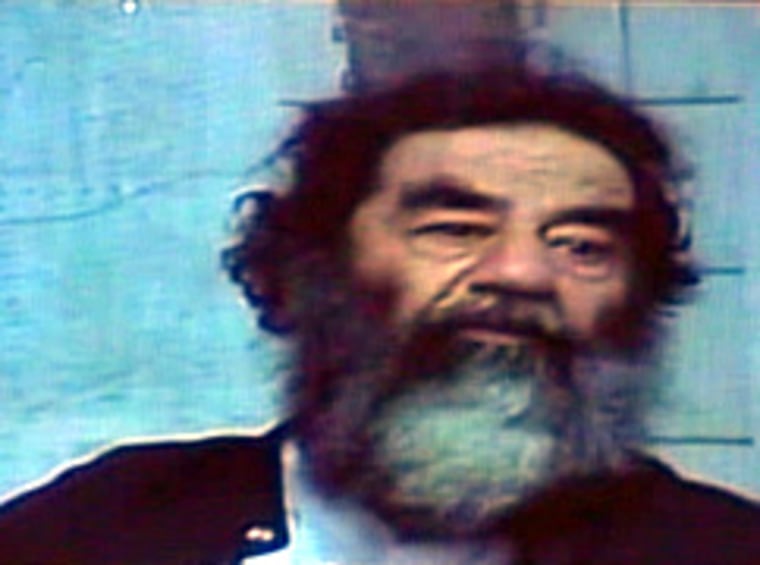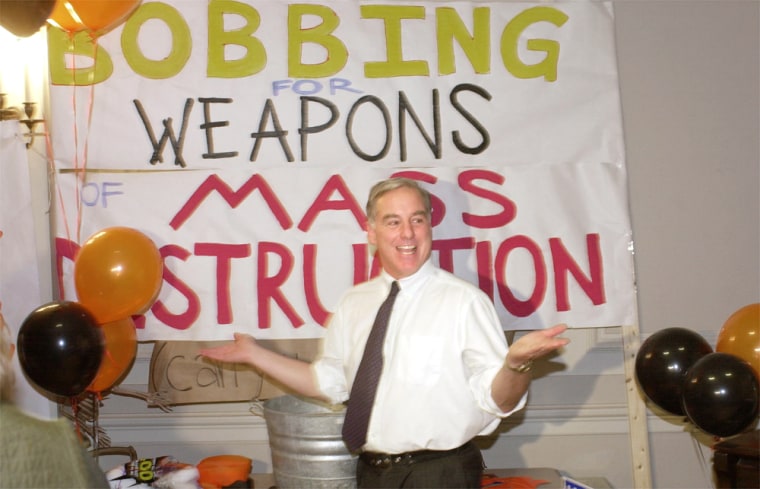As the political effects of Saddam Hussein's capture reverberate over the next several weeks, President Bush's re-election strategists will be able to pull the rug -- at least part of the way -- from under Democratic presidential contenders who have criticized Bush for failing to capture both Saddam and Osama bin Laden.
In the short run at least, Saddam’s capture is very good news for the “hawks” among the Democratic presidential contenders such as Sen. Joe Lieberman of Connecticut and Rep. Dick Gephardt of Missouri, and not good news for harsh critics of Bush’s handling of Iraq operation, such as Democratic front-runner Howard Dean.
"I supported this effort in Iraq without regard for the political consequences because it was the right thing to do," Gephardt said in a written statement. "I still feel that way now and today is a major step toward stabilizing Iraq and building a new democracy."
Lieberman pointedly sharpened the differences between himself and Dean in an interview Sunday morning with Tim Russert on NBC’s Meet the Press.
“This is the choice the voters have to make in the primaries: If Howard Dean had his way, Saddam Hussein would be in power today, not in prison,” Lieberman told Russert.
Only two weeks ago Dean threw a rhetorical challenge at Bush, saying, “"Mr. President, if you'll pardon me, I'll teach you a little about defense."
Dean’s audacious claim to be Bush’s “teacher” on national security issues will seem even shakier now that Bush can point a dictator who was not only toppled but is in custody.
Dean had already misstepped in his initial reaction to the fall of Baghdad by sounding a bit grouchy and ungracious last April.
“We’ve gotten rid of him (Saddam Hussein), I suppose that’s a good thing,” Dean said on April 9. “But there’s going to be a long period where the United States is going to need to be maintained in Iraq and that’s going to cost the American taxpayers a lot of money that could be spent on schools and kids.”
In contrast Lieberman noted Sunday that ever since 1998 he had called for the overthrow of Saddam.
“I always felt he was ticking time bomb,” Lieberman said. After the Sept. 11 attacks on the United States, Lieberman remarked, “I said to myself even more deeply I don’t want to wake up some day… after Saddam Hussein takes some action to hurt and kill Americans and say ‘why didn’t we knock him over when we could have?’”
When MSNBC's Chris Matthews asked Dean two weeks ago whether Saddam, if captured, should be tried and put to death, Dean replied, "we are allowing the Bosnian war criminals to be tried at The International Court in The Hague. That suits me fine. As long as they're brought to justice and tried, and so far we haven't had to have that discussion because the president has not been able to find either one (Saddam or Osama bin Laden)."
But Lieberman said Sunday, "this evil man has to face the death penalty. The International Tribunal at The Hague can not order the death penalty.”
Saddam was, Lieberman noted, “a homicidal maniac, a brutal dictator, he wanted to dominate the Arab world and was supporting terrorists. He caused the deaths of more than a million people, including now 460 Americans who went to overthrow him.”

Speaking to reporters Sunday, Dean said, "This is a great day of pride in the American military, a great day for the Iraqis and a great day for the American people and, frankly, a great day for the administration. I think President Bush deserves a day of celebration. We have our policy differences, but we won't be discussing those today. I think he deserves a day to celebrate as well."
In a twist of fate, Saddam’s capture came just one day before Dean was scheduled to deliver his first major national security address since becoming the undisputed front runner in the Democratic field.
In a memo sent out to reporters just a few hours before Saddam’s capture, the Dean campaign previewed Monday’s speech saying “he will charge that advocates of a go-it-alone approach in the current administration ‘are leading America in a radical and dangerous direction.’”
Dean is also set to introduce his key foreign policy and military advisors Monday.
In crafting their reaction statements to the capture of Saddam, Dean and the other Democratic contenders walked a fine line between congratulation, caution and continued criticism.
In order not to seem ungracious they could not afford to pour too much cold water on the news.
Yet even with Saddam in custody, Democratic presidential hopefuls must still try to make the argument to voters that Bush is incompetent in his handling of national security and therefore needs to be ousted so a Democrat can replace him.
Massachusetts Sen. John Kerry told NBC's Tom Brokaw Sunday, "This is an opportunity for the president to bury some of the hubris of the administration and the unilateralism of it and go back to the world community and say, 'OK, we all have a stake in making certain that we don't have a failed state in Iraq....' The president has a great moment here to bring people to the task of getting more people on the ground, reducing the risk to American soldiers, reducing the overextension of our forces, and frankly reducing the cost in dollars to the American taxpayer."
As Kerry's and Dean's comments indicated, some early Democratic reaction took the form of “Yes, this is good news but Bush still has not…” then Democrats will fill in the blank, by arguing that Bush has not yet:
- Provided a definite timeline of withdrawal of U.S. forces from Iraq.
- Created the conditions for stable government in Iraq.
- Found weapons of mass destruction that Saddam’s regime was thought to have in the run-up to war, the weapons that provided the reason for toppling him.
- Killed or captured Osama bin Laden.
- Rendered al Qaida no longer a threat to America and other countries.
The implicit message to the voters always is – as it must be – “I could do a better job at all these things, so elect me.”
Saddam in custody is a prize for Bush and his supporters but the way former Yugoslav leader Slobodan Milosevic has managed to use his on-going trial at The Hague to portray himself as a martyr underscores the risks of putting Saddam on trial.
Bush and his aides face a delicate decision on how to try Saddam and ensure he does not transform himself into another Milosevic.
Meanwhile, Bush strategists will keep an eye out for "a revolution of rising expectations" among voters, who may wonder: can we bring our troops home now -- or at least soon?
